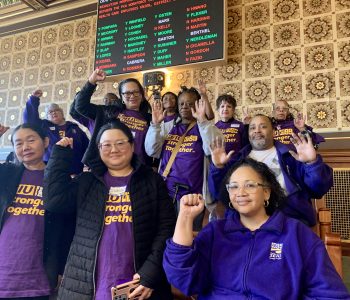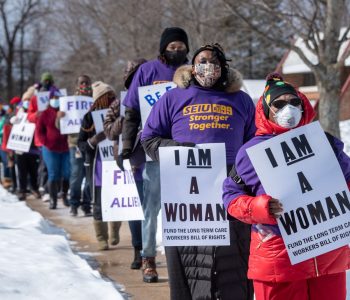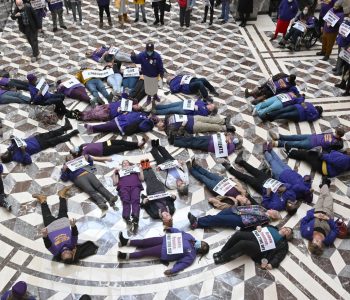 Home Care
Home Care
The Labor and Public Employees Committee voted Thursday to advance a bill that would fine companies that act as fiscal intermediaries that don’t pay workers promptly.
SB 942 was prompted by repeated problems with Allied Community Resources, which is contracted by the Department of Social Services to manage payroll for personal care assistants whose clients receive Medicaid.
The bill would help protect people like Michelle Colon, a PCA for a woman with advanced dementia. Colon didn’t get paid on time on March 12 even though her timecard information was submitted correctly and in advance of the weekly deadline.
“I’m busting my butt working and risking my health,” the 24-year-old Colon said. “It’s not fair that they aren’t paying me. I couldn’t pay my rent. This is not okay with me.”
She’s not the only one, according to Sen. Jorge Cabrera, D-Ansonia. Low wage earners have consistently had problems with getting paid on time no matter what industry, Cabrera said.
“I’ve met with families who have been strung along and not paid,” in a previous job working in the labor movement, Cabrera said. “This bill would be another tool. I’m abeliever that if you work, you should get paid on time and you should get paid what you deserve.”
Cabrera voted with the majority, eight Democrats and one Republican, to send the bill to the Senate.
Colon is among thousands of members of the New England Health Care Workers Union SEIU 1199 who have had problems with Allied for several years, union leaders said. PCAs are predominantly Black and brown women who hold down multiple jobs to make ends meet, the union said. They receive no vacation, sick pay or health care benefits through the arrangement with DSS, the agency that provides funding for their pay.
Allied is cooperating with a DSS-directed corrective action plan that focuses on making sure call center wait times are within contract standards and that the maximum number of timesheets are paid in each time period, the agency said.
But problems are continuing, said Sen. Julie Kushner, D-Danbury. “I understand that mistakes may not always be on the part of the payroll company,” Kushner said. “But what’s clear is that if they are going to be a fiscal intermediary for this kind of workforce, they must be in a position to adjust payroll very quickly for the workers and they haven’t been able to do that.”
The bill requires companies like Allied to notify workers as quickly as possible to rectify problems with their timecards and then pay the worker within 48 hours. Under the legislation, a company acting as a fiscal intermediary would be fined $25 a day for each separate violation of failing to pay promptly.
Another portion of the bill would designate companies that act as fiscal intermediaries as “employers” solely for the purpose of requiring them to abide by state labor laws.
In written testimony, company officials complained that the proposed law would place unfair financial burdens on fiscal intermediaries who are enforcing rules set by the state of Connecticut and approved by the Centers for Medicare and Medicaid Services.
“The fiscal intermediary also has fiduciary responsibilities to safeguard the state program funds and has contractual requirements to follow and enforce the state and federal program rules, many of which are included to prevent fraud,” wrote Carol Bohnet and Don Waddell, the CEO and executive director of Allied Community Resources’ parent company.
The company said that about 5% of the nearly 47,000 timecards it processed in January had errors that the PCAs had to correct before being paid. It went on to say that it could not pay an average of 450 monthly timecards by Friday of the pay week for a variety of administrative reasons. The testimony did not explain why an additional 350 timecards were not processed on time.
Of the unpaid timecards, 71 or .16% of the total timecards received cannot be paid due to eligibility, hospitalizations, deceased or the client was over the budget plan, the company said. Those issues must be approved by the state before they can be processed. The other 375 contain errors that fall under the state’s quality assurance regulations to prevent fraud, Bohnet and Waddell said.
In their testimony, Bohnet and Waddell said that Allied “understands and sympathizes” with the employees whose pay is affected, but they oppose the legislation.
Colon says she submitted her error-free timecard on Feb. 28 along with the timecards of two other PCAs who work for her client. “My timecard was sent in the middle, the other two were paid,” Colon said. “I could understand it if all three were held up, but the others weren’t.”
Colon didn’t receive her pay on March 12 when the others did, she said. She emailed and called the company but didn’t get a response for two days. She asked the union and the state to intervene.
“I had proof that they had received it,” she said. “They ignored my phone calls and my emails for two days. As a hard worker, that’s a kind of abuse.”
Original article from CT News Junkie






